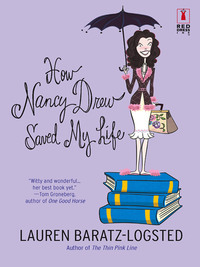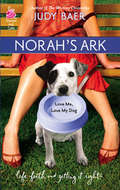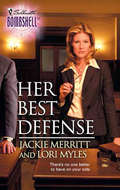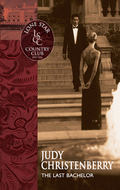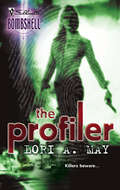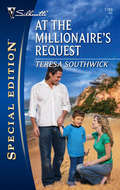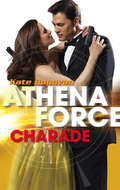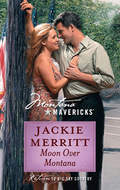Raamatut ei saa failina alla laadida, kuid seda saab lugeda meie rakenduses või veebis.
Loe raamatut: «How Nancy Drew Saved My Life»
How Nancy Drew
Saved My Life
Lauren Baratz-Logsted

MILLS & BOON
Before you start reading, why not sign up?
Thank you for downloading this Mills & Boon book. If you want to hear about exclusive discounts, special offers and competitions, sign up to our email newsletter today!
Or simply visit
Mills & Boon emails are completely free to receive and you can unsubscribe at any time via the link in any email we send you.
For my mother, Lucille Baratz, one of the world’s greatest
ladies, and the woman who gave me my first Nancy Drew.
Mom, if I keep putting off dedicating a book to you,
will you stay with us forever?
Contents
Prologue
Chapter 1
Chapter 2
Chapter 3
Chapter 4
Chapter 5
Chapter 6
Chapter 7
Chapter 8
Chapter 9
Chapter 10
Chapter 11
Chapter 12
Chapter 13
Epilogue
About the Author
No book is ever written in a vacuum, even if it feels that way at times, and this book is certainly no exception, so here come the curtain calls.
Thanks to Margaret O’Neill Marbury, Rebecca Soukis and the whole RDI team, with special thanks to Keyren Gerlach for going above and beyond.
Pamela Harty is in a line all by herself for restoring my faith and giving me my shot, all in one go—thank you forever.
Thanks to the Friday night writing group: Greg Logsted, Jerry Brooker, Andrea Schicke Hirsch, Rob Mayette, Lauren Catherine Simpson. What I want to know is: Who’s bringing the wine next week?
Thanks to the Monday night reading group: Irene Clarke, Anita Hannan, Cheryl McCaffrey, Jacquie Pugsley, Rebecca Tate and my longtime friend Jeannine Fagan. I’m a better reader, writer and mother because of all of you.
If I lived forever, I could not thank Sue Estabrook enough for making me a better writer and a better person.
And if I listed all the friends and family I’m grateful for we wouldn’t be here all day, but we would be here for quite a bit, so suffice it to say you know who you are and by now, you ought to know what you mean to me. That said, I would be beyond remiss not to thank those who are under my roof as I write this:
Thanks to my niece, Caroline Logsted, for bringing so much unlooked-for joy into our lives; thanks to my daughter, Jackie, who makes me marvel every day, not merely that I have a child, but that I have this child; thanks to my husband, Greg, for being the greatest man who ever lived. Without the three of you, I would be both less sane and less insane; certainly, I would be less loved.
prologue
People think it must be easy for you, when they see you out here on the wire.
They think you don’t know fear.
But what they never stop to consider is that you know fear better than anybody and your greatest fear is not being here, not taking the chance, not living this life.
Some people think it’s brave to fight in wars and I suspect it must be true. Some people think it’s brave to go after your career dream and while I wish it were personal experience talking here, I suspect that must be true, as well. But the bravest thing of all, to me, is to love another human being, to take the chance of being disappointed, to risk having your heart broken.
That’s the wire I’m talking about, the only wire that really matters in the end.
In spite of everything that happened to me, I still believe this to be true.
chapter 1
You know, none of this ever would have happened, were it not for that Maureen Dowd column in the New York Times. After all, it’s not like grown women over the age of twenty think very much about Nancy Drew, is it? Besides which, as a young girl, I’d not been much of a Nancy Drew fan. Sure, I’d seen the shelves of her books in the libraries and bookstores I frequented whenever I got the chance, but she’d seemed so other-timely, outdated, so retro in a way that would never be fashionable again.
At least that’s what I thought.
Anyway, the article had one of those oblique angles, as these things so often do, but it was generally about Iraq and the Osama bin Laden Presidential Daily Briefings. The tie-in with Nancy Drew was that we really needed someone brash and intrepid like her involved, and questioned where all the brash and intrepid people had gone.
As for me, at the age of twenty-three, I no longer felt brash and intrepid, since events had conspired to rob me of those feelings.
I had committed the cardinal sin of many a young woman before me, something Nancy Drew would never do: I had fallen in love with a married man—named Buster, no less; with two kids, no more. I know it was a foolish thing to do, inexcusable, too, and I know it sounds lame to say he made me fall in love with him.
Except that’s the truth.
I would have been content to admire him from afar, but he drew me in, came at me like a freight train, convinced me his wife neither loved nor understood him and they hadn’t had sex in forever—I can hear you laughing at me now!—and I was the only woman he’d ever really been in love with, that no other woman had ever been as smart or as sexy or as funny or as wonderful and nothing better had ever happened to him in his life than loving me. He convinced me it would be a crime against the universe were we not to reach for this rare chance so few people ever know in this life: to be with someone, not because both parties are settling or desperate or fooling themselves, but because all the crossed stars in the firmament had deemed it should be so.
And I fell for it.
He was like a master glassmaker, building a floor underneath me, sheet by sheet of perfect glass, laid one next to the other like the most sparking tile in the world. And he led me out to the center of that amazing floor, had me stand right in the middle waiting for my Cinderella moment. But before I got my chance to dance with the prince, the craftsmanship turned into a game of Don’t Break the Ice. You know the game, where you take turns using little red and green plastic mallets to knock the cubes of white plastic ice one by one through the red plastic frame until one poor sucker dislodges the catastrophic piece that sends the little red plastic figurine at the center thudding through to the floor. Well, it was just like that, with me playing the part of the little red plastic figurine.
Only it was so much worse.
Buster got me right where he wanted me, out on that amazingly gorgeous crystal dance floor, constructed solely for me, and then he began smashing those glass tiles he’d made for me, one by one, until at last I fell through the floor, flaying my skin, shredding my soul and breaking my heart in the process.
I had always believed there are keys to the inner workings of every person alive. When love is wrong or insufficient, people jealously guard those keys, preferring to play games instead, making the other person guess at what is required, knowing the other person will fail miserably. When love is right, good, you gladly hand over the keys; you trust, and let the other person know exactly what makes you tick, for good or ill. I gave Buster so many of my keys, I let him inside me. I thought I had his keys, too, and he just ransacked the whole fucking place, like the Grinch paying a call on Cindy Lou Who the night before Christmas, and left me with no more than some picture-hanging wire and a few nails sticking out of the walls. I should have seen it coming, but still…how could he do that to me? How could he do that to me in the way in which he did it?
I could go into all the gory details, but why bother? These stories always end the same. Suffice it to say, I was the only one destroyed, certainly not Buster.
I don’t think his wife ever knew.
I sincerely hope she did not.
Not that she was any great shakes as a human being herself.
I’ll tell you one thing for damn certain: Nancy Drew never would have fallen in love with a married man.
In the wake of my bust-up with Buster, I moved temporarily back in with my aunt Bea and her three kids. It wasn’t so much that I wanted to be there, and it was sure as rain that the four of them didn’t particularly want me back there, but I was feeling too emotionally fragile to strike out on my own right away. Plus, for one thing, my exit from Buster’s household had been too abrupt for me to find something right away—slim chance to find a decent apartment in New York City on the same day as one starts looking. Two, I didn’t intend the situation to be permanent, just long enough until I could make up my mind and clearly decide what to do next. Three, last but not least, despite that I had some savings from my long-ago glory as a commercial child star, it would dwindle with alarming speed if I took up residency for a few months—the optimum time needed, I figured, to recover from a major heartbreak—in a New York City hotel room.
Thus it was, in the wake of my breakup with Buster and having moved back in with my aunt, that I saw the Times article that led me to Nancy Drew. It was in that same edition of the Times that I found my next nannying position, for I had indeed been the nanny to Buster’s own two kids, in his Manhattan penthouse on the Upper West Side.
The classified ad read:
WANTED!
NANNY
Full-time position.
Applicants must be willing
to travel to Reykjavik.
It said the job would not start for another two months, but since there had not been any other listings in the recent weeks since I’d been checking—indeed, the recession we were supposedly not having had dried up even the nanny market—I figured it was Reykjavik or bust for me. Now, if only I knew where Reykjavik was….
It is indeed possible to be widely read, as I am, and still have black holes in one’s knowledge. So, although I’m a nanny by profession, my sense of geography sucks. I’d thought St. Louis was in the state of New Orleans—well, wouldn’t it be better if it was, both places being great for jazz, and I used to get Las Vegas and Los Angeles mixed up on a regular basis.
Don’t even get me started on where Michigan should really be.
After the part about the delayed start date, the ad listed a fax number for sending résumés.
I pulled a copy of my résumé from out of the stack in the folder on my dresser—I might not be feeling intrepid anymore, but a member of the Mary Poppins profession is always prepared—and went in search of Aunt Bea to see if she would let me use her fax machine.
Given that I’d lived in that household, a Greenwich Village town house, off and on since my father moved to Africa when I was three—more on him and my mother later—you would not think I’d still have to obtain permission for such minor things. Oh no. I’m guessing you never lived in a household like Aunt Bea’s.
I found her in her king-size brass bed—nothing about Aunt Bea’s desire for luxury was ever small—huddled under the frilly bedsheets, a can of SlimFast with a straw on the night table, the TV tuned to All My Children; another thing we differed on, to her unending horror, as I was a Days of Our Lives fan, born if not bred, just like my late mother.
Aunt Bea at fifty looked about ten years older than she needed to. Not that she didn’t make every vain effort to look younger, at least as far as clothing choices and makeup, but she’d spent so much of her life frowning that she was as in need of Botox as a shar-pei.
But she was scared of needles.
And botulism.
I had learned over time, through many trials and a whole slew of errors, that the best way to get something out of Aunt Bea was to appeal to her sense of her own needs. Certainly, appealing to her sense of my needs hadn’t gotten me anywhere.
“Excuse me?” I coughed.
“Can’t you see Erica’s about to have one of her big scenes?” Aunt Bea didn’t even look in my direction.
It seemed to me that Erica was always having big scenes and that her big scenes were never as big as Marlena’s big scenes, but what did I know?
I sucked it up and plowed on.
“There’re almost no want ads anymore in the Times,” I said woefully.
“But you have to get a job,” she said, eyes still glued to Erica. “You can’t stay here forever.”
“True, true.”
I let that rest for a minute. Then:
“In that whole big paper today, there was only one job I’m qualified for. And you know there haven’t been any other ads for nannies in weeks…”
“What job?” She looked at me sharply.
I produced the ad from behind my back, holding the résumé in reserve.
“Here,” I said. “But look, it’s all the way in Reykjavik.” I wrinkled up my nose. “Do you know where Reykjavik is?” Usually, the nose-wrinkling is an affectation on my part, but not this time. “Isn’t it in Yugoslavia somewhere—is Yugoslavia even still there?—or Poland? Cities in those countries always end in ‘k,’ right?”
“Reykjavik doesn’t ring any strong bells?” Aunt Bea asked.
I shook my head.
“Reagan?” she prompted.
“I know who he was,” I admitted cautiously.
“Gorbachev?” she prompted some more. “Big summit there? Reagan proposed complete disarmament and the Pentagon went crazy because, at that time, the USSR had a huge conventional military superiority over NATO and the West needed its nuclear deterrent? Still nothing?”
I shook my head.
“What year was this?” I asked.
“Nineteen eighty-six,” she snapped, as though only a fool, or someone like me, wouldn’t know the answer.
“It was kind of before my time,” I said. “I’m fairly certain I was still mostly preoccupied with my Little People Farmhouse back then.”
“You don’t know anything,” she said, disgusted.
I shrugged. Maybe I didn’t.
“It’s in Iceland,” Aunt Bea said.
Crap, Iceland sounded cold. Oh, well.
“Oh,” I said. “I was kind of worried you’d say that.”
“You mean you asked me when you knew all along?”
“Let’s just say I had my suspicions. I was kind of hoping for mainland Europe somewhere. So,” I said. “Iceland.”
“Population one hundred and seventy thousand in Reykjavik, last time I checked,” she said.
“Ah,” I said. “Puny.”
“Whole country doesn’t have more than three hundred thousand, I don’t think,” she said.
“You wonder why they bother,” I said.
“So,” she said, handing the paper back to me, “what are you planning to do about this? Reykjavik is nice and far away…”
There was that Aunt Bea gleam, the gleam of the aunt who loved me so well.
“Well, it does have a fax number for résumés here…”
“What are you waiting for?” Aunt Bea demanded.
Your permission, I thought, since we both know that if I had used the fax first and asked later, no matter what the good cause, even if it had been to help starving children in the Third World, you’d have done something insane like deny me hot water for a month.
Home may have been the place where, when you’re desperate, they have to let you in. But some had creepy red rooms that were like mental torture chambers in the upstairs and some homes still sucked.
“Get going!” Aunt Bea shooed me.
I went, having gotten my own way the hard way.
I may have been down and out, but I was still perky and resilient. That’s one thing you should know about me: even when I’m not feeling at all brash and intrepid, I’ve always been perky and resilient.
As I fed my résumé facedown through the fax machine, I thought about what was on the business side of it: my name, Charlotte Bell; my address, here; my early schooling, unspectacular; my two years of business college, entered into upon and completed at Aunt Bea’s insistence, since she thought I’d never amount to much and wanted to make sure I embarked on a path that would ensure this would be so. After that, of course, there was my three years in Ambassador Bertram—Buster to his friends—Keating and Mrs. Keating’s home as nanny to their two kids.
I’d gotten the Keating job through an agency. Upon receiving my business-college certificate and having decided that I didn’t want to do anything remotely business related, and having Aunt Bea at my back pushing me to get a job that would earn me enough money to get me out of the house, I’d decided to kill all the birds with one stone: I’d take a job that would, by definition, get me out of the house twenty-four hours a day.
I’d be a live-in nanny.
How hard could it be?
Perhaps I’d read too many gothic novels as a young child and was romanticizing the job, but I pictured young children looking up to me and me loving them; I pictured feeling competent.
Okay, obviously I wasn’t thinking about anything by Henry James.
The way I figured it, though, being a nanny would be the perfect confidence-building thing to get me out of Aunt Bea’s house. And, so long as nobody noticed the gaps in my knowledge, like geography, everyone involved would be better for it.
I looked again, ruefully, at the résumé I was faxing.
Since the only job I’d ever held of any substance was in the household of a man I’d made the mistake of sleeping with during most of my three-year stint there, and since being an adulteress hardly qualifies one in the eyes of the world as being good for much of anything other than more adultery, you would think I’d be trepidatious at the notion of my future riding on so little.
But if you thought that, again you would think wrong.
And isn’t it amazing how close intrepid and trepidatious are when you look at them on the page like that? Hard to believe they could be such different things and that at different points in my life I was destined to be one or the other.
One thing I was sure about: Ambassador Buster would give me the greatest reference the world had ever seen, if only to get me out of town, so that he could stop feeling so damn guilty and stop worrying that I’d turn all Fatal Attraction on him, sneaking into his house and boiling a rabbit in his pot.
In addition to football, Buster also watched a lot of movies. Really, once TiVo had entered the picture, it was a wonder he got any ambassadorial work done at all.
Nope, I was more Buster’s worry than he was mine and, really, the one thing you never want to do is piss off the nanny.
Like I said, I’m nothing if not perky and resilient, even if I’m still a far way from intrepid.
chapter 2
Fax faxed, I took myself down to my local Barnes & Noble, a three-story building I treated like a second home, attending as many author readings there as I could, haunting the stacks for new books like a crack addict searching for her next fix.
Since I had read as many literary novels and commercial truffles as I could stand for the nonce, and since Maureen Dowd had put Nancy Drew on my mind, I made my way to the children’s department and looked around until I found the originals in the series: small jacketless hardcovers, with their bright yellow spines and blue lettering, the original old-fashioned artwork still on the front.
Feeling pluckier already, I plucked the first one off the shelf. It was The Secret of the Old Clock. I turned it over, expecting there to be some description of the plot of the book, but all there was was some kind of all-purpose blurb about the series—“For cliff-hanging suspense and thrilling action…”—and a listing of the first six titles in the series, followed by the promise, “50 additional titles in hardcover. See complete listing inside.”
Fifty-six seemed like an awful lot of titles to have to live up to “cliff-hanging suspense” and “thrilling action,” particularly if they featured the same character time and time again. How good could Nancy Drew be? Was she really that exciting or was someone pulling the young consumer’s leg?
As I’d said before, I’d never read much Nancy Drew as a young girl, could only remember liking The Witch Tree Symbol, better known to whoever compiled that comprehensive list at the back of the book as #33.
I plucked #33 from the shelf, flipped through it, the memories flooding me. There was Nancy climbing on top of a tabletop, holding a lantern up to a ventilator and passing one hand in front of the light at intervals such that the S.O.S. signal would be transmitted, over and over again. (I’d have just screamed for help and then died before anybody came, because help was too far away to hear a scream but it could see a well-planned S.O.S. signal.) There was the young detective, at the end of the book, not thinking about what she’d just been through but rather turning her mind to the next mystery, with a ham-fisted authorial plug for The Hidden Window Mystery, #34.
I put the book back on the shelf. It all seemed so…kitschy.
But suddenly I found myself curious, curious to know what had attracted generations of readers. Even if I had always assumed her to be too retro for my tastes, year after year the books had kept selling. And, surely, if Maureen Dowd was touting her as the answer to the world’s problems…
It took several scoopings, but I scooped up all fifty-six books, everything from #1, The Secret of the Old Clock—and that clock on the cover really did look old, with Nancy sitting there on the ground at night, looking all intrepid in her green dress and sensible watch, legs tucked ladylike to the side as she prepared to do something unladylike to that clock with the handy screwdriver in her hand—to #56, The Thirteenth Pearl, with its vaguely pagodaish cover. So #56 was the last one? I thought. God, I hoped she didn’t die in the end. Even if I didn’t end up liking her any more than I had as a little girl, that’d just kill me after reading about her for fifty-six books. I was fairly sure that after reading all fifty-six books, I’d start feeling attached.
Then I noticed that there were other books on the shelves with “Nancy Drew” on their spines but with different packaging. So she did live on!
I hauled my armloads over to the nearest available register and plunked the books down.
“A completist’s present for some special young person?” the young man at the counter asked.
“Yes,” I said, opening my wallet to pull out the necessary cash. “Me.”
He raised a tastefully pierced eyebrow.
“My childhood wasn’t so good and adulthood hasn’t been much better so far,” I said, “so I’m doing a do-over here.”
He just shrugged. Apparently, he’d waited on weirder.
Fifty-six books at $5.99 each came to…
“Three hundred and thirty-five dollars and forty-four cents plus tax,” he said. “Cash or cre—?”
I handed over the cash.
Okay, so maybe I was an out-of-work and underpaid nanny looking to become an in-work and underpaid nanny yet again, but I did have cash left over from my commercial child-star days.
So then why, you may well ask, was I living off of Aunt Bea’s meager largesse when I could have afforded a place of my own?
Because when Buster had broken my stupid little heart, he’d shattered it completely, despite the justified anger I tried to cling to. I’d been absolutely shattered, having believed I’d found true love, only to have it smashed away—and the only place I’d had the strength to go to was home, such as it was; home to Aunt Bea.
Nancy and I have nothing in common, I thought, absolutely nothing, as I read the beginning of #1.
It said that Nancy Drew was an attractive girl of eighteen, that she was driving along a country road in her new, dark blue convertible and that she had just delivered some legal papers for her father.
Apparently, her dad had given her the car as a birthday present and she thought it was fun helping him in his work.
It went on to say that her father was Carson Drew, a well-known lawyer in River Heights, and that he frequently discussed puzzling aspects of cases with his blond blue-eyed daughter. Smug, I thought, Nancy was pleased her father relied on her intuition.
Nancy was nothing like me. She was five years younger, for one thing. She also drove, a convertible no less; I couldn’t even drive a donkey cart, had never even bothered getting my license. Who needed a car if you’d lived all your life in the city? It would only be a nuisance here, even a convertible in the summer. Besides, I was kind of terrified of driving, would rather poke a needle through my own eye than be responsible for powering a vehicle.
Nancy also had a father who trusted her to help him with things, while all I had was Aunt Bea to trust that I would fuck everything up and a father in Africa whom I rarely saw. I seemed to remember Nancy being motherless, like me, but somehow I doubted we’d lost our mothers in the same fashion.
Finally, there was that whole thing about her being blond and blue-eyed—wasn’t she supposed to be famously titian-haired? I seemed to remember that, too, and remembered thinking the word sounded glamorous but then thinking it icky when I’d learned the Webster’s definition of it was “of a brownish-orange color,” which hardly sounded attractive—which was in direct opposition to my own curly black hair and brick-brown eyes.
I hated her already.
The bitch probably didn’t even have any cheesy cellulite on the backs of her thighs. It would be nice to be able to say I was too young to worry about cellulite, but genetics will out and mine had outed itself post-puberty in an unpleasant way. Oh, nothing too major, just enough to make the idea of appearing on a beach in a bathing suit somewhat less than confidence-building.
Feeling more disgusted than I’d expected to feel, I put aside #1 and picked up #56, the one with the pagoda on the cover, and turned to page one again.
Nancy was discussing some drink called Pearl Powder with friends Bess and George.
I remembered being confused by George when I was a little girl. Obviously, George was a boy’s name, and yet whenever there were pictures of the girls with Nancy’s boyfriend Ned in the book, I’d always think Ned was George and wonder where Ned was and who was that other girl? It was years before I sorted George’s androgyny out.
I grumbled. I didn’t have any friends.
Before Buster, I’d had a few friends, at least people to do things with and people to talk to when times got rough. But after I succumbed to Buster’s charms, I committed the other cardinal sin that girls make: I made the man not just the center of the universe, but the entire universe, and I let everyone else drift off to different galaxies.
So maybe I messed up that metaphor, but so what, because in that moment, I realized I no longer had any friends, not like Nancy did, not even a friend of not-readily-determinable sexual orientation like George.
You could say I felt sorry for myself. I knew my own choices and actions had led me to where I was, but I still felt sorry for myself.
If things had somehow worked out with Buster—not that I’d ever been able to define for myself, even before the bust-up, what would constitute things “working out” with a married man plus two kids—would I still be feeling sorry for myself at this point?
Probably, I figured. Because I would have still reached that critical state in a relationship where you realize you’ve let all your friendships die and all you have left is the one relationship.
Not that I’d had any other experience with relationships.
Come to think of it, I’d had limited experience with friendships, too.
I glanced down that first page of #56 and saw that—omigod!—Nancy was still eighteen! How was such a thing possible? I was pretty sure that even Sherlock Holmes, over the course of his many adventures, had aged a few years. So how had Nancy managed to age not one year over the course of fifty-six mysteries? I quickly did the math.
Okay, I went to find my calculator.
Figuring it wasn’t a leap year—because what are the odds? Something like one in four?—I did the division. Let’s see…365 divided by 56 is…6.5178571. 6.5178571??? This…teenager was solving mysteries at the rate of one every six and a half days? What kind of a girl was she? Oh, man, was I sooo not her.
Talk about an overachiever.
But then, after I was annoyed for a really long time, I started to think, How cool!
Imagine having one incredibly long year, the most stretched-out year imaginable, with enough time to get right everything a person needed to get right. What would I do with such a year? I couldn’t change the past. But maybe in changing my present, I could change my future?
I looked at the calendar on the back of my bedroom door, kittens in Greece, the sole present I’d received from Aunt Bea for my birthday: it was April 26. So, calculator time again, I had already lost 116 days so far that year—it wasn’t a leap year—meaning I’d already blown the chance to solve 17.846153 mysteries. But hey, there were still 249 days left, so there was still the opportunity for me to solve the remaining 38.153847 mysteries.
Whatever they were.
If only I could get up to speed real fast.
Actually, I was beginning to think that even I should be able to solve .153847 mysteries. It was the 38 part, I suspected, that would be the problem.
For the remainder of the two months until it was time for me to get on the plane to Iceland, I could read a book a day of Nancy Drew, leaving me five days at the end for shopping, packing and biting my nails to the quick.
Except for the day I went for the job interview, of course. Even someone desperate for a nanny who was willing to leave her life and go to Iceland wasn’t going to hire that nanny without first meeting her in person…. No matter what kind of wonderful things Ambassador Buster had said about her.
Tasuta katkend on lõppenud.
